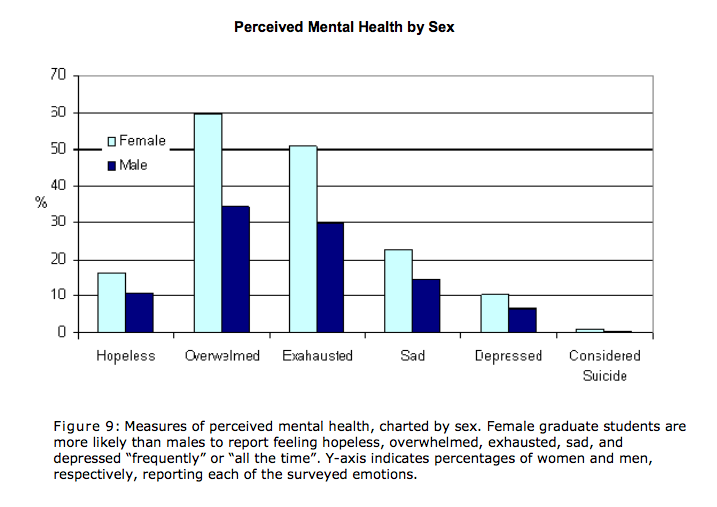A few years back UC Berkeley did a study of the mental health of graduate students. The results were quite astounding.
The study found that 67% of graduate students that were able to get paid to take surveys said they had felt hopeless at least once in the last year; 54% felt so depressed they had a hard time functioning; and nearly 10% said they had considered suicide (note that in the graph below shows considering suicide “frequently” or “all the time”, thus the percentage difference). Female respondents were more likely to report feeling hopeless, exhausted, sad, depressed, or suicidal. By comparison, an estimated 9.5% of American adults suffer from depressive disorders, according to the National Institute of Mental Health. Read more at Women in Astronomy.

Your data doesn’t match what you’re saying:
“10% considered suicide.” – Your graph shows this much below, at perhaps 1%. (Unless I’m misreading this graph?)
(These are still awful statistics for depression and I can fully appreciate why they are so high, having been an undergraduate for 3 years at a high pressure university.)
Note that in the graph below shows considering suicide “frequently” or “all the time” whereas the text is just considered suicide at least once in the past year. This is the cause of the percentage difference.
Yeah, I broke down crying two days ago at my desk because I was frustrated with myself and my lack of progress on my project. Which no one will ever hear about in my group/department, because no one really wants to come off as a slacker who isn’t working all the time, even though my department is probably more relaxed than many out there (and I know that perception isn’t true).
Just thought I’d mention that before folks come in here to cite how the survey is flawed statistically so that means this isn’t a problem, or something.
This used to be very common in my graduate program as well, practically everyone had some form of depression, until we found our ways to cope with it (quit grad school, move away to write their theses in places where they had family/close friends, marriage, etc.). It is a very serious problem.
I just came across this post this very interesting entry. Unfortunately, problems are not circumscribed to graduate school. I am a postdoc with now a number of years under my belt and I have never felt so mentally fragile, up to the point of having serious, and to be honest quite scary, health issues. The clear worsening of my situation over the last few months has made me try to step back a bit and think about the actual cause of all this. Naturally this is a very personal feeling and it may or may not reveal anything on the current state of astronomy. Executive summary: our careers are decided by little else than luck and various parameters that are completely outside of our control. This lack of control is pretty devastating as there is nothing much we can do to land a tenured position for certain.
Over the last few years with each rejection for a permanent position, I interpreted this (probably wrongly) as: “I am just not a good enough scientist, I should work more to produce more and better papers, have more students, etc.”. Of course as a result, personal life takes a nasty toll, hobbies are but a vague memory from a distant past, work engulfs everything and I lost taste for pretty much anything and everything. On top of that I thought it would be good that I involve myself more in the community, organizing conferences and whatnot. In itself this is not intellectually challenging but this drains energy in a remarkable and unfortunate way, leaving me completely exhausted. Then at some point it came as a revelation that a significant fraction of my friends and colleagues having landed a permanent position recently had fewer/less cited papers than me, some had fewer/no student, some had less/no teaching experience, some had not done any community service in their career, etc. Conversely I have some postdoc colleagues who are very impressive scientists and perfectly decent human beings (I would understand why a department would not want to hire a sociopath even with an outstanding CV), who just cannot seem to get a permanent position. When asking for some feedback where I should improve to land a permanent job I generally get a consistent feedback “Your application/CV/interview had no weak point. It was just extremely hard to choose who to offer the position.”. At some point it just came as an epiphany that a lot of it just has to do with luck. Tiny, insignificant things outside of our control probably make the balance tip one way or another, all else being equal. There is certainly no recipe to land a position. As a senior researcher told me once: “just do great science and forget about the rest. Obsessing about things you have no control on will just ruin your health”. Now the tough part is to stop caring about all those things. If others also had similar issues it would be great to hear about their experience and how they managed to solve them.